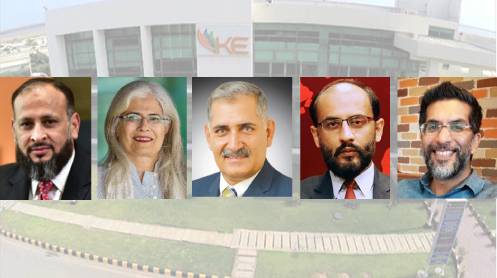- Time to Act: Accelerating Renewables for a Sustainable, Reliable, Affordable Energy Future
- Addressing the Energy Trilemma Through Investing in Renewable Energy
- Twin Pillars of a Sustainable Future – Renewables & Energy Efficiency
- K-Electric Leads Discussion on Pakistan’s Renewable Energy Trajectory
Karachi, May 16, 2024: Although Pakistan continues to grapple with its energy challenges, the nation has been actively incorporating renewable energy into its energy strategy. To delve deeper into this critical topic, Nutshell Group hosted the most recent iteration of their webinar series, ‘The Future of Energy’ in collaboration with K-Electric, titled The Trajectory of Renewable Energy in Pakistan.
K-Electric’s commitment to renewable energy and its advocacy for renewables in Pakistan have been longstanding. As the largest power distribution company in Pakistan’s major metropolis, K-Electric has consistently demonstrated a forward-thinking approach to energy transition. As emphasized by the CEO, investing in sustainability is not merely a cost but a strategic investment with significant returns. By embracing renewable energy, K-Electric actively tackles environmental concerns as well as bolstering energy security and making power more affordable.
This webinar which was moderated by Ali Khizar, Economist and Business Analyst, Head of Research at Business Recorder showcased a panel of esteemed speakers provided invaluable insights into the current and future landscape of Pakistan’s renewable energy sector. Among the experts were Afia Salam, Environmentalist, Senior Journalist, and Media Consultant; Syed Moonis Abdullah Alvi, CEO of K-Electric; Prof. Dr. Fiaz Chaudhry, Professor and Director of LUMS Energy Institute, Program Director of Power Sector Centre of Excellence, and CEO of Engineers Guild (Pvt) Ltd; and Dr. Khalid Waleed, Head of Energy and Climate at the Sustainable Development Policy Institute.
K-Electric’s CEO, Moonis Alvi emphasized the importance of investments in renewable energy and grid infrastructure: “By 2030, K-Electric plans to boost renewable energy share up to 30% and reduce reliance on imported fuel. The company will include 640 megawatts of affordable renewable electricity to its system in the next two years through solar and wind energy projects, which will lead to a notable decrease in the cost of generation. This will, in turn, support the government in balancing the sustainable induction of energy with its long-term affordability.”
Moonis impressed upon the importance of integrating renewable energy plans within a broader framework, highlighting the need for regulatory approval. He noted that the addition of new power sources to Pakistan’s energy mix is now determined through competitive bidding processes.
Environmental journalist, Afia Salam highlighted the critical role of integration as the overarching solution to address the diverse challenges confronting Pakistan’s power industry. She acknowledged the importance of achieving alignment and cooperation among all stakeholders to salvage the sector, emphasizing that unified efforts and shared objectives are essential to fostering a sustainable and resilient power industry in Pakistan. Additionally, Salam highlighted the imperative of optimizing resource utilization and minimizing waste. She noted that the power industry transcends mere energy generation, recognizing that true conservation warrants a holistic approach. Salam questioned the proliferation of concrete structures nationwide, citing the significant carbon emissions associated with concrete use and the heightened energy consumption required for its temperature control. She advocated for the adoption of indigenous building methods, critiquing the reckless and brazen outlook that perpetuates presently rampant unsustainable construction practices.
Furthermore, Salam stressed the importance of advancing technology in the sector to reduce reliance on outdated and environmentally damaging methods. She emphasized the need for sensible and forward-thinking approaches to ensure a sustainable and prosperous future for Pakistan’s power industry – a sentiment mirrored by Prof. Dr. Fiaz stating, “The inadequate construction of our homes significantly contributes to the challenges faced by the power industry. It is imperative that homes and buildings prioritize energy efficiency to alleviate these challenges.”
Dr. Khalid Waleed from SDPI added to the discussion, pointing out Pakistan’s unique energy consumption patterns: “In Pakistan, 50% of electricity demand comes from residential consumers, while only 20% comes from the industrial sector. This presents a conundrum that requires integrated macroeconomic planning aligned with the trajectory of the power industry.”
It is the objective of forums like the Future of Energy and the discussions therein which foster meaningful dialogue, encourage knowledge sharing, and ignite collaborative efforts to accelerate Pakistan’s transition to renewable energy. Through these endeavours, Nutshell Group, in collaboration with K-Electric, is doing their part to enhance energy security, promote sustainability, and drive economic growth across Pakistan.
About K-Electric:
K-Electric (KE) is a public listed company incorporated in Pakistan in 1913 as KESC. Privatized in 2005 KE is the only vertically integrated utility in Pakistan supplying electricity within a 6500 square kilometres territory including Karachi and its adjoining areas. The majority shares (66.4%) of the company are listed in the PSX owned by KES Power, a consortium of investors including Aljomaih Power Limited of Saudi Arabia, National Industries Group (Holding), Kuwait, and the Infrastructure and Growth Capital Fund (IGCF). The Government of Pakistan is also a minority shareholder (24.36%) in the company.







